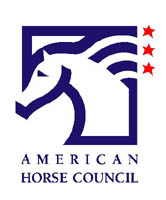|

|
 |
November 3 Legislative Update from the
AHC: Horse Slaughter Ban Included in USDA Appropriations Package with a
Proviso The effort at the federal level to ban the slaughter of horses for human consumption took another step forward – and then perhaps a step sideways - when Congress passed the U.S. Department of Agriculture Fiscal Year 2006 Appropriations bill this week. The legislation includes a provision to prohibit USDA from using federal funds to pay salaries and expenses of USDA personnel to inspect horses for slaughter. But it also includes a provision allowing horse slaughter facilities to hire other personnel to inspect horses and thus continue operating. The President is expected to sign the legislation into law shortly. USDA Funding Ban The funding ban amendment was included in both the House and Senate versions
of the USDA Appropriations legislation when each body considered their
versions of the bill earlier this year. The provision also survived the
conference between House and Senate negotiators over the final language,
although in an altered form. The Conference agreed to the provision, but
delayed its effective date for 120 days to February 1, 2006. New Authorization for Private Inspectors at Horse Facilities The legislation finally passed by Congress also included an amendment to the federal inspection requirements that will allow horse processing plants to operate on a “fee for service” inspection program after the 120 day funding deferral expires. This will allow them to hire other inspectors, at their cost, for the slaughter process. This change will enable those plants that wish to hire the inspectors to continue to operate and remain in business during the federal funding ban. The practical effect of this additional change to federal law may mean that the original, underlying funding ban may not have the result that its supporters had expected, if processing facilities decide to hire their own inspectors. Primary House Bill Calling for Permanent Ban In February, 2005, Congressman John Sweeney (R-NY) introduced broader federal legislation to prohibit the slaughter of horses for human consumption. That bill (H.R. 503) was also sponsored by Congressmen John Spratt (D-SC) and Ed Whitfield (R-KY). It presently has over 118 co-sponsors. This bill would prohibit the shipping, transporting, delivering, receiving, possessing, purchasing, selling, or donation of horses and other equines for slaughter for human consumption. Violations of the Act would subject a person to penalties of up to $3,000 and/or one year in jail for the first offense and up to $5,000 and/or two years in jail for a second offense. An offender may also be subject to civil penalties of $2,000 for each violation. The bill authorizes $5 million for enforcement. The bill has been referred to the House Energy and Commerce Committee. There have been no hearings on this bill. Primary Senate Bill Calling for Permanent Ban Senator John Ensign (R-NV) has introduced the Virgie S. Arden American Horse Slaughter Prevention Act (S. 1915) in the Senate to prohibit the slaughter of horses for human consumption. Co-sponsors include Senators Mary Landrieu (D-LA), Robert Byrd (D-WV), Arlen Specter (R-PA), Trent Lott (R-MS), Joseph Lieberman (D-CT), Daniel Inouye (D-HI), Carl Levin (D-MI) and Jim DeMint (R-SC). The bill has been referred to the Committee on Commerce, Science and Transportation. The legislation is a companion bill to the House bill (H.R. 503). Like the House measure, the bill would amend the Horse Protection Act (HPA). |
| Back to News |
BENEVOLENCE | BENEFITS | GROOM ELITE | PERSONNEL | LINKS | CONTACT US
